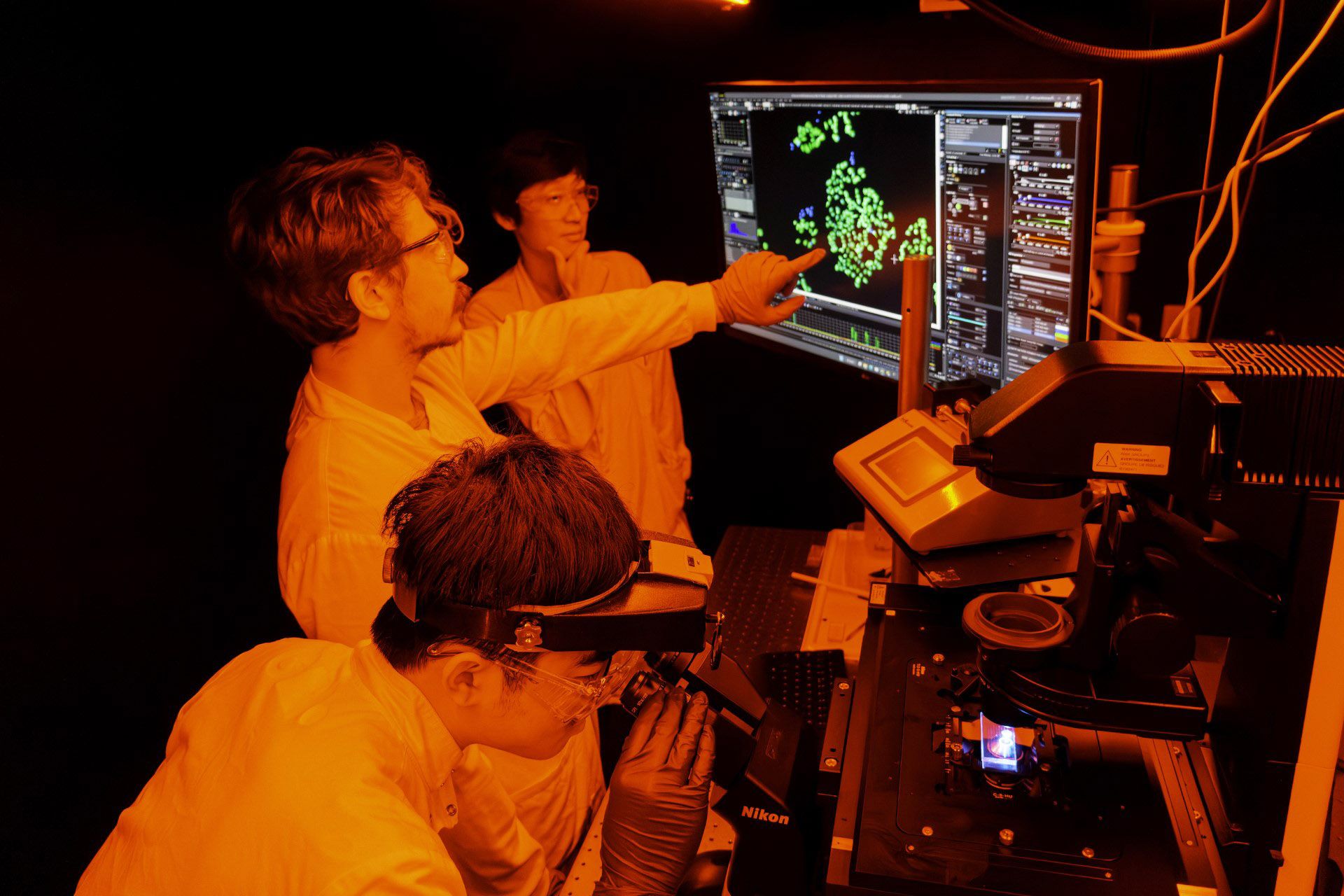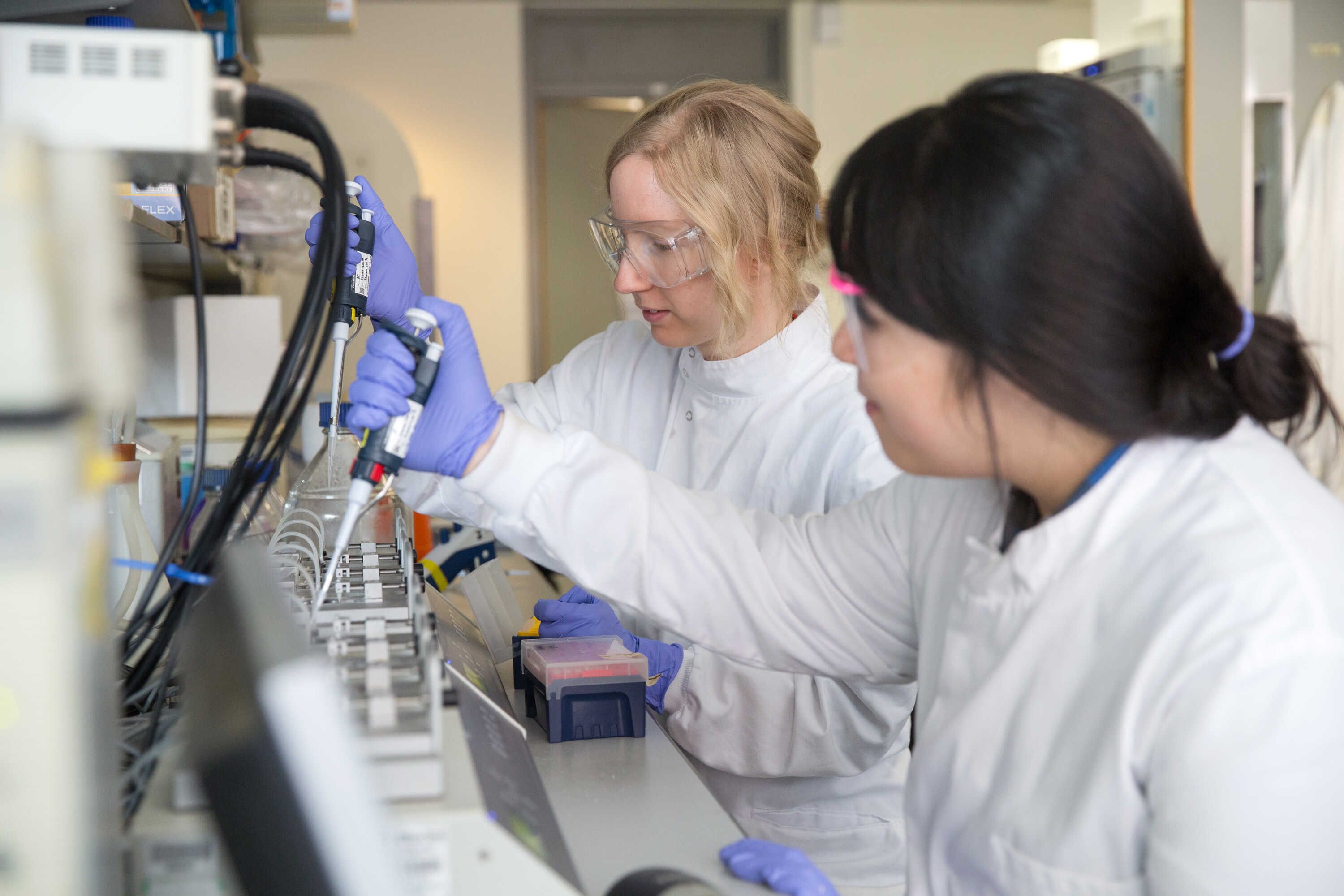
Cancer Biology (Cancer Innovation)
Learn to tackle biological and medical challenges in cancer, with a focus on translating cutting edge bio- and deep-tech research from concept to application.
Learn at the forefront of cancer innovation with a focus on real-world applications
Build your understanding of cancer biology and learn to translate and communicate new technologies
Immerse yourself in a multidisciplinary research environment on a focused research project in world leading labs
Course key facts
-
Qualification
-
MRes
-
-
Duration
1 year
-
Start date
September 2025
-
Study mode
Full-time
-
Fees
£17,100 Home
£45,000 Overseas
-
Delivered by
-
Location
-
Hammersmith
-
Minimum entry standard
-
2:1 in science, engineering, biomedical science or medicine
Course overview
Develop skills across disciplines to further your proficiency of experimental and computational research, and push forward research in cancer biology.
In this Cancer Innovation stream, you will focus on the development of novel, innovative approaches to biological and medical problems in cancer. Blended learning with demonstrations and workshops will train you in the translation of biotechnology platforms, from concept to realisation and onward to application in the clinical/commercial environment.
You will learn the skills to critically analyse current literature and performance data. Beyond this, you’ll be trained to communicate technological concepts to both scientific and commercial audiences, as well as to patients themselves.
This research-oriented course offers students the opportunity to conduct an innovative 10-month research project. These can be wet-lab/dry lab projects or original research and analysis.
You will be trained in the cellular and molecular basis of cancer biology, as well as receiving an introduction to the clinical and pathological aspects of carcinogenesis and treatment.
On completing this course, you will be ready to continue a career in groundbreaking research or pursue varied career paths where an advanced knowledge and understanding of cancer research is highly sought after.
MRes Cancer Biology streams
This course is one of three MRes Cancer Biology streams available at Imperial. You may wish to consider other streams depending on your interests.
- Cancer Biology focuses on wet lab skills, data analysis, and communicating science to expert and lay audiences.
- Cancer Informatics focuses on computational and artificial intelligence techniques, ethics, and communicating science to expert and lay audiences.
- Cancer Innovation (this stream) focuses on the development and translation of bio- and deep-tech platforms from concept to realisation and onward to application and communication to scientific and commercial audiences.
This course page was previously titled "Cancer Innovation MRes". It has been relabelled for clarity to show that this is a stream of our Cancer Biology course. When applying via our My Imperial application system, please apply to "Cancer Biology (Cancer Innovation)", which is the title of the MRes degree you will be working towards.
Structure
This page is updated regularly to reflect the latest version of the curriculum. However, this information is subject to change.
Find out more about potential course changes.
Please note: it may not always be possible to take specific combinations of modules due to timetabling conflicts. For confirmation, please check with the relevant department.
You’ll take all of these core modules.
Core modules
Learn the cellular and molecular basis of cancer processes and hallmarks, together with clinical and pathological aspects of carcinogenesis and treatment.
Learn through demonstrations and workshops to train students in the translation of a biotechnology platform from concept to realization and onward to application in the clinical/commercial environment.
This includes critical analysis of current literature and performance data and the communication of technology concepts to both scientific and commercial audiences. It will also include a business concept presentation.
Conduct an innovative 10-month research project, with wet-lab/dry lab projects undertaken primarily at Imperial College London.
Some opportunities will be available for projects that collaborate with industry and at other organisations such as the Bart’s Cancer Institute, the Francis Crick Institute, GlaxoSmithKline, the Institute of Cancer Research, and the Medical Research Council.
You'll be expected to produce a persuasive and logical experimental study proposal based upon contemporary research.
Teaching and assessment
Teaching and learning methods
-
Lectures
-
Technical workshops
-
Tutorials
-
Seminars
-
Student-led presentations
Balance of assessment
Key
- Modules
- Project
- 10% Modules
- 90% Project
Assessment methods
-
Presentations
-
Literature review
-
Poster presentation
-
Projects (thesis and oral assessment)
-
Oral assessment
-
Mock grant proposal
Entry requirements
We consider all applicants on an individual basis, welcoming students from all over the world.
How to apply
Apply online
You can submit one application form per year of entry. You can choose up to two courses.
Application deadlines – Round 2 closes on Sunday 26 January 2025
We consider applications to this course in four batches. Applications received before the closing date of each round are considered in those batches, and applicants are then required to attend an online interview.
If you wish for your application to be considered in a particular batch, please apply at least five working days before the deadline to ensure your application is included in that round of decision making.
The application dates are:
- Apply by 24 November 2024: Online interviews 9-13 December 2024
- Apply by 26 January 2025: Online interviews 10-14 February 2025
- Apply by 23 March 2025: Online interviews 23-25 April 2025
- Apply by 31 May 2025: Online interviews 16-20 June 2025
Competition for places on this programme are high, with 70% of all offers being made following the January submission date.
While we do continue to make offers March to June, less than 5% of our remaining offers are made following the May submission date.
This is a stream in our Cancer Biology course. When applying via our My Imperial application portal, you should select the correct stream you wish to apply for, at the start of the process.
There is no application fee for MRes courses, Postgraduate Certificates, Postgraduate Diplomas, or courses such as PhDs and EngDs.
If you are applying for a taught Master’s course, you will need to pay an application fee before submitting your application.
The fee applies per application and not per course.
- £80 for all taught Master's applications, excluding those to the Imperial College Business School.
- £100 for all MSc applications to the Imperial College Business School.
- £150 for all MBA applications to the Imperial College Business School.
If you are facing financial hardship and are unable to pay the application fee, we encourage you to apply for our application fee waiver.
Find out more about how to apply for a Master's course, including references and personal statements.
An ATAS certificate is not required for students applying for this course.
Tuition fees
Home fee
2025 entry
£17,100
You should expect and budget for your fees to increase each year.
Your fee is based on the year you enter the university, not your year of study. This means that if you repeat a year or resume your studies after an interruption, your fees will only increase by the amount linked to inflation.
Find out more about our tuition fees payment terms, including how inflationary increases are applied to your tuition fees in subsequent years of study.
Whether you pay the Home or Overseas fee depends on your fee status. This is assessed based on UK Government legislation and includes things like where you live and your nationality or residency status. Find out how we assess your fee status.
If you're a UK national, or EU national with settled or pre-settled status under the EU Settlement Scheme, you may be able to apply for a Postgraduate Master’s Loan from the UK government, if you meet certain criteria.
For courses starting on or after 1 August 2024, the maximum amount is £12,471.
The loan is not means-tested and you can choose whether to put it towards your tuition fees or living costs.
Overseas fee
2025 entry
£45,000
You should expect and budget for your fees to increase each year.
Your fee is based on the year you enter the university, not your year of study. This means that if you repeat a year or resume your studies after an interruption, your fees will only increase by the amount linked to inflation.
Find out more about our tuition fees payment terms, including how inflationary increases are applied to your tuition fees in subsequent years of study.
Whether you pay the Home or Overseas fee depends on your fee status. This is assessed based on UK Government legislation and includes things like where you live and your nationality or residency status. Find out how we assess your fee status.
If you're a UK national, or EU national with settled or pre-settled status under the EU Settlement Scheme, you may be able to apply for a Postgraduate Master’s Loan from the UK government, if you meet certain criteria.
For courses starting on or after 1 August 2024, the maximum amount is £12,471.
The loan is not means-tested and you can choose whether to put it towards your tuition fees or living costs.
Scholarships
The Dean’s Master’s Scholarships
Value per award
- £10,000
Who it's for
- All students applying to study a Faculty of Medicine Master’s course
The Dr Jean Alero Thomas Scholarships
Value per award
- Partial or full tuition fee at the Home rate
Who it's for
- All students applying to study a Faculty of Medicine lab-based Master’s course
How will studying at Imperial help my career?
Break new ground in careers applying innovation and business to the field of cancer biology.
The course will provide you with applied and transferable skills needed for multidisciplinary roles requiring advanced knowledge and understanding of cancer research.
This can include areas such as research, business and start-ups, journalism, financial institutions, and patent and intellectual property roles.
Further links
Contact the department
Course Director: Dr James Flanagan
Stream Director: Dr Ali Salehi-Reyhani
Visit the Department of Surgery and Cancer website

Register your interest
Stay up to date on news, events, scholarship opportunities and information related to this course.

Events, tasters and talks
Meet us and find out more about studying at Imperial.

Terms and conditions
There are some important pieces of information you should be aware of when applying to Imperial. These include key information about your tuition fees, funding, visas, accommodation and more.
You can find further information about your course, including degree classifications, regulations, progression and awards in the programme specification for your course.
Programme specifications